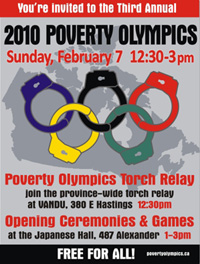Vancouver’s Olympic Challenge: City Faces Pressure to Fulfill Social Pledges That Helped It Win 2010
By Doug Struck
Washington Post Foreign Service
Monday, July 23, 2007; Page A11
VANCOUVER — Rob Skish is looking forward to the 2010 Winter Olympics. A “binner” who plumbs garbage containers to fill his shopping cart with food for his stomach and cans for the recycler, Skish figures that when the Olympic crowds come to town, the pickings in the bins will be good.
“They’ll be full,” said Skish, 40. “But there will be a lot more people picking. They will come from all over the world.”
Skish’s prediction is the stuff of bad dreams for Vancouver Mayor Sam Sullivan.
When the Winter Olympics open in Vancouver, visitors will find one of the most alluring cities in North America, a green and vibrant port to Asia brimming with diversity, skyscrapers and West Coast cool. But if they take a wrong turn, they will enter Downtown Eastside, a 16-block area teeming with drug dealers, addicts, prostitutes and panhandlers.
The side alleys are open markets for crack cocaine and crystal methamphetamine. The streets reek of urine. Rates of AIDS and hepatitis C are at Third World levels. Those who don’t have rooms in some shabby flophouse sleep on the pavement. A U.N. report last month called the area “the trouble in paradise.”
To win the Games, Vancouver and the provincial and federal governments made some of the boldest promises of any Olympic bid. They promised to add 800 new housing units a year for four years. They promised to cut homelessness and to ensure that people living on welfare and disability checks aren’t ousted from their hotels for higher-paying guests.
The city had already seen that happen once. Thousands of low-income residents were dislocated for the 1986 world’s fair, Expo 86. Olaf Solheim, an 88-year-old former logger with a long white beard, starved to death, disoriented and confused, after being evicted from his home of more than 40 years at the Patricia Hotel in Downtown Eastside. A welfare housing block is now named after him.
“I believe the Downtown Eastside will be the legacy of this Olympics. It will be a lot different,” the mayor said in an interview at City Hall. “We want every investment we make to leave a legacy that is needed by the city.”
Such promises helped swing a 2003 referendum that threatened to scuttle Vancouver’s Olympic bid. Opponents of the Games argued that the money should be spent on social programs, not a two-week party. Before the vote, the city, provincial and federal governments appeased skeptics by agreeing to ambitious housing and social goals to leave the city a better place.
The pledges also helped sway the International Olympic Committee, smarting from examples such as Atlanta, where vagrants were bused out of town, and Beijing, where thousands of people reportedly have been dislocated by Olympic construction.
But now critics are saying that Vancouver’s promises are turning up empty. The three governments involved conceded last month that insufficient funds have been budgeted for the social programs. It is “questionable” whether all of the promised housing will be built, a report from the governments acknowledged.
“The people of Downtown Eastside feel betrayed,” said Harry Bains, a member of the provincial legislature for the minority New Democratic Party. “The promise was made to the world that we will protect these people, so that everyone benefits from the Olympics. We should keep
our commitments.”
